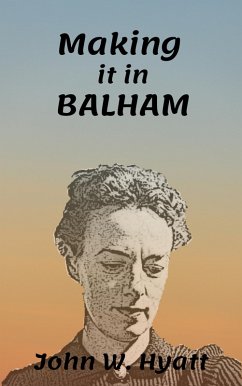Making it in Balham is set in London during 1958 against a backdrop of slum clearance and post war building. There are riots taking place and racial tension is rife.
Despite all this, the Prime Minister Harold Macmillan announced the previous year that most of our people have never had it so good. This sentiment was viewed with some scepticism by the majority of working people, but proved true for the moneyed classes, who marvelled at the growth in the economy; set back during the austerity of the post war years, and now seen to be booming. This sense of increasing affluence generally gave rise to a feeling of optimism as Britain headed towards the 1960s.
We meet Agnes Bracken, at the age of twenty-seven, aware of these changes, but feels left behind. Agnes works as a short-hand typist for a law firm, and wishes for a better lifestyle with the least effort on her part. She is ambitious, and strives to break from her working-class roots through education and elocution lessons. This step however, is difficult. Agnes lives at home with her parents in their old-fashioned house in Whitechapel that is scheduled for demolition to make way for a housing estate. She wants a place of her own, but her wage isn't very much, and she despairs at finding anything within her budget, or even anything she likes.
Agnes's feeling of dissatisfaction is due to two events that occurred during her childhood. The first of these came about when she, along with thousands of London children, were evacuated during the war. Agnes went to live with a wealthy family in Devon. Their relaxed and affluent lifestyle turned her head, and upon her return to her own family, she at once felt dissatisfied with her parent's lowly home.
The second major turning point for Agnes was when she passed her examination at the age of eleven, and was awarded a place at the grammar school. There she met girls of her age from wealthy families; girls who enjoyed elaborate holidays, owned ponies, and had access to hundreds of books in the home.
Agnes, again looks on, and wishes the same for herself. She longs for a nice house in a good area; preferably with someone to do the cleaning and the cooking. Why should some people have these benefits and not her?
The seed of ambition is then firmly sown in her mind. Agnes seeks a better life than one of semi-poverty. She wants to avoid the penny-pinching, the scraping, and the just getting by. She shuns the slow grinding poverty accepted without question by her parents, and in turn expected of her. Agnes hates the thought of being poor.
Further to this, Agnes wants to make her mark on the world. Her mark, her stamp; to become someone of consequence, and perhaps even famous.
We then meet Inga who comes from Denmark and is different in every way to Agnes. Inga never mentions her parents, but she is believed to have been orphaned at an early age. Inga briefly mentions her dead fiancé, Berdt, tragically lost at sea. This event, and the ensuing grief, persuades Inga to break with her homeland and live in England.
Inga wants to teach at an English school, but at this she fails because her spoken English is not good enough. Inga works as housekeeper to a mysterious man of business known to her as Mr. Brown. Later, she works at a school, but only as an assistant. Inga does not have very nice accommodation in London. She lives in a share-house in Brixton, and there meets Michael Odide, an African law student.
Despite their disparity, the two women and Michael become friends. Agnes's life certainly changes after meeting Inga, and becomes more
Dieser Download kann aus rechtlichen Gründen nur mit Rechnungsadresse in A, B, CY, CZ, D, DK, EW, E, FIN, F, GR, H, IRL, I, LT, L, LR, M, NL, PL, P, R, S, SLO, SK ausgeliefert werden.









